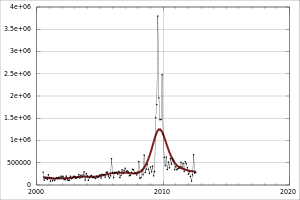Building the Education Revolution

Building the Education Revolution (BER) is an Australian government program administered by the Department of Education, Employment and Workplace Relations (DEEWR) designed to provide new and refurbished infrastructure to all eligible Australian schools.[1] The program was part of the Rudd government's economic stimulus package designed as a response to the 2007–2010 global financial crisis.
The program, totalling A$16.2 billion has three elements:[1]
- Primary Schools for the 21st Century ($14.2b): providing new and refurbished halls, libraries and classrooms
- Science and Language Centres for 21st Century Secondary Schools ($821.8m): providing new and refurbished science laboratories and language learning centres
- National School Pride program ($1.28b): providing new and refurbished covered outdoor learning areas, shade structures, sporting facilities and other environmental programs.
The program has attracted attention from critics of the government for alleged "rorting" (misappropriation of public funds) and for not delivering value-for-money outcomes. Instances of inflated quotes or new buildings that were not particularly useful to the school were reported. The Leader of the Opposition Tony Abbott called for a judicial inquiry into the BER and the Home Insulation Program, described by the opposition Liberal Party as "failed programs" and a "waste of public money".[2]
In April 2010, the government announced the formation of the BER Implementation Taskforce "to ensure projects are providing value for money". Gillard defended the BER saying that it was "already one of the most heavily scrutinised programs in the nation's history" and that the program was the "centerpiece" of an economic stimulus package that helped to "ensure that a generation of Australians weren't consigned to months or years of joblessness".[3]
After the 2010 election BER moved under the portfolio of Senator Chris Evans.
The Taskforce, headed by Brad Orgill, former chairman and chief executive of UBS Australasia, delivered its report to Senator Evans on 15 December 2010. The report found that most of BER projects had been successfully delivered, with only 3% of the schools involved in the program making complaints. Projects in NSW received the most complaints. The third and final report by Brad Orgill found that BER projects in NSW, QLD and VIC overpaid for buildings by more than 25% on average compared to Catholic schools and more than 55% compared to Independent schools.[4] The ANAO investigation into the project ruled that comparison with those projects were not valid as the standards applied to government school facilities were higher.[5][6]
Economist Joseph Stiglitz commented in August 2010 that the government's stimulus package, including the BER, was well-designed by world standards and that some waste was inevitable.[7]
On 25 March 2014 three Australian academics published a paper in the International Journal of Public Administration that argued that the BER program represents a "'case study' of how governments should not pursue large-scale public expenditure programs".[8] The paper says that the BER illustrates the pitfalls of large-scale public expenditure programs, and that it did not provide value for money.[9]
See also
References
- 1 2 "Building the Education Revolution". Nation Building: Economic Stimulus Plan. Department of Education, Employment and Workplace Relations. Archived from the original on 17 April 2010. Retrieved 16 April 2010.
- ↑ "http://www.smh.com.au/national/abbott-demands-schools-batts-inquiry-20100405-rmqh.html". Sydney Morning Herald (Sydney: Fairfax). 5 April 2010. Retrieved 16 April 2010. External link in
|title=(help) - ↑ Gillard, Julia (13 April 2010). "New taskforce an extra check on spending". The Australian (Sydney: News Limited). Retrieved 16 April 2010.
- ↑ Klan, Anthony (8 July 2011). "BER waste tops $1.5 billion". The Australian (Brisbane: News Limited). Retrieved 8 July 2011.
- ↑ Keane, Bernard (5 May 2010). "Read all about it: the BER program worked, and worked well". Crikey. Retrieved 23 June 2013.
- ↑ "Building the Education Revolution - Primary Schools for the 21st Century". Australian National Audit Office. Retrieved 23 June 2013.
- ↑ "Stimulus 'served Australia well' despite waste". ABC news (Australian Broadcasting Corporation). 10 August 2010. Retrieved 24 March 2011.
- ↑ "Building the Education Revolution: Another Case of Australian Government Failure?". 25 March 2014. Retrieved 1 April 2014.
- ↑ "Labor's BER reforms "a case study of failure"". The Australian (Sydney: News Limited). 1 April 2014. Retrieved 1 April 2014.